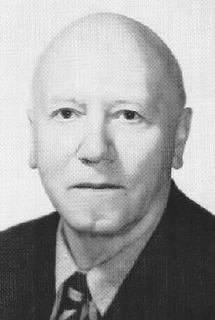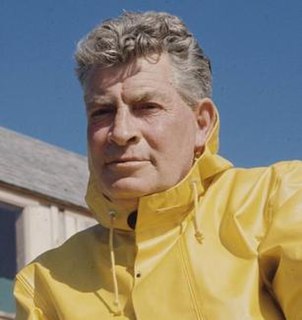A Quote by C. D. Broad
I shall no doubt be blamed by certain scientists, and, I am afraid, by some philosophers, for having taken serious account of the alleged facts which are investigated by Psychical Researchers. I am wholly impenitent about this. The scientists in question seem to me to confuse the Author of Nature with the Editor of Nature; or at any rate to suppose that there can be no productions of the former which would not be accepted for publication by the latter. And I see no reason to believe this.
Related Quotes
God is true. The universe is a dream. Blessed am I that I know this moment that I have been and shall be free all eternity; ... that I know that I am worshiping only myself; that no nature, no delusion, had any hold on me. Vanish nature from me, vanish these gods; vanish worship; ... vanish superstitions, for I know myself. I am the Infinite. All these - Mrs. So-and-so, Mr. So-and-so, responsibility, happiness, misery - have vanished. I am the Infinite. How can there be death for me, or birth? Whom shall I fear? I am the One. Shall I be afraid of myself? Who is to be afraid of whom?
Our alleged facts might be true in all kinds of ways without contradicting any truth already known. I will dwell now on only one possible line of explanation, - not that I see any way of elucidating all the new phenomena I regard as genuine, but because it seems probable I may shed a light on some of those phenomena. All the phenomena of the universe are presumably in some way continuous; and certain facts, plucked as it were from the very heart of nature, are likely to be of use in our gradual discovery of facts which lie deeper still.
Nature. As the word is now commonly used it excludes nature's most interesting productions-the works of man. Nature is usually taken to mean mountains, rivers, clouds and undomesticated animals and plants. I am not indifferent to this half of nature, but it interests me much less than the other half.
Our moods do not believe in each other. To-day I am full of thoughts, and can write what I please. I see no reason why I should not have the same thought, the same power of expression, to-morrow. What I write, whilst I write it, seems the most natural thing in the world; but yesterday I saw a dreary vacuity in this direction in which now I see so much; and a month hence, I doubt not, I shall wonder who he was that wrote so many continuous pages. Alas for this infirm faith, this will not strenuous, this vast ebb of a vast flow! I am God in nature; I am a weed by the wall.
The difference between a man who is led by opinion or emotion and one who is led by reason. The former, whether he will or not, performs things of which he is entirely ignorant; the latter is subordinate to no one, and only does those things which he knows to be of primary importance in his life, and which on that account he desires the most; and therefore I call the former a slave, but the latter free.
My love affair with nature is so deep that I am not satisfied with being a mere onlooker, or nature tourist. I crave a more real and meaningful relationship. The spicy teas and tasty delicacies I prepare from wild ingredients are the bread and wine in which I have communion and fellowship with nature, and with the Author of that nature.
I heard there are no male sidhe-seers." Where did you hear that?" Around." And which one of those are you in doubt about Ms. Lane?" Which one of what?" Whether I see the Fae, or whether I'm a man. I believe I've laid your mind to rest on the former; shall I relieve it on the latter?" He reached for his belt. Oh, please." I rolled my eyes. "You're a leftie, Barrons." Touche, Ms. Lane," he murmered.
Therefore, in my incontrovertible capacity as plaintiff and defendant judge and accused, I condemn this nature, which has so brazenly and unceremoniously inflicted this suffering... since I am unable to destroy Nature, I am destroying myself, solely out of weariness of having to endure a tyranny in which there is no guilty party.
To suppose universal laws of nature capable of being apprehended by the mind and yet having no reason for their special forms, but standing inexplicable and irrational, is hardly a justifiable position. Uniformities are precisely the sort of facts that need to be accounted for. Law is par excellence the thing that wants a reason. Now the only possible way of accounting for the laws of nature, and for uniformity in general, is to suppose them results of evolution.
Philosophers often think all scientists must be scientific realists. If you ask a simple question like "Are electrons real?" the answer will be "Yes". But if your questions are less superficial, for example whether some well-known scientist was a good scientist. Then, they had insisted that only empirical criteria matter and that they actually did not believe in the reality of sub-atomic entities. Ask "If that turned out to be true, would you still say they were good scientists?" The answer would reveal something about how they themselves understood what it is to be a scientist.
And as this is the obvious appearance of things, it must be admitted, till some hypothesis be discovered, which by penetrating deeper into human nature, may prove the former affections to be nothing but modifications of the latter. All attempts of this kind have hitherto proved fruitless, and seem to have proceeded entirely from that love of simplicity which has been the source of much false reasoning in philosophy.
What the scientists have always found by physical experiment was an a priori orderliness of nature, or Universe always operating at an elegance level that made the discovering scientist's working hypotheses seem crude by comparison. The discovered reality made the scientists exploratory work seem relatively disorderly.







































